Items filtered by date: August 2022
Pinched Nerves Can Cause a Variety of Uncomfortable Symptoms
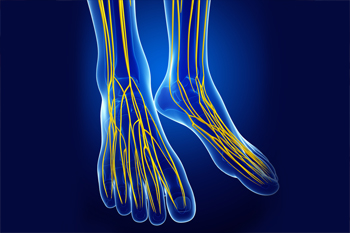
A pinched, or compressed, nerve can occur anywhere in your foot, such as in the heel, ball, or even on the bottom. A pinched nerve can produce pain or sensations of tingling, numbness, weakness, or the feeling that your foot has fallen asleep. The pain may radiate out to the toes or arches and become noticeable after exercising, walking, or standing for a while. What causes a nerve in your foot to become pinched? Injuries, medical conditions, tight ligaments, inflamed tendons, wearing tight shoes, obesity, or nerve entrapment conditions such as Morton’s neuroma. Switching footwear, resting, icing, immobilizing the area, or massaging it can sometimes provide temporary relief. However, if the symptoms persist or worsen, a podiatrist should examine your foot and run tests to determine the cause of your condition. Taking prompt, appropriate action will help reduce the risk of permanent nerve damage.
Foot Pain
Foot pain can be extremely painful and debilitating. If you have a foot pain, consult with one of our podiatrists from Parkwood Podiatry. Our doctors will assess your condition and provide you with quality foot and ankle treatment.
Causes
Foot pain is a very broad condition that could be caused by one or more ailments. The most common include:
- Bunions
- Hammertoes
- Plantar Fasciitis
- Bone Spurs
- Corns
- Tarsal Tunnel Syndrome
- Ingrown Toenails
- Arthritis (such as Gout, Rheumatoid, and Osteoarthritis)
- Flat Feet
- Injury (from stress fractures, broken toe, foot, ankle, Achilles tendon ruptures, and sprains)
- And more
Diagnosis
To figure out the cause of foot pain, podiatrists utilize several different methods. This can range from simple visual inspections and sensation tests to X-rays and MRI scans. Prior medical history, family medical history, and any recent physical traumatic events will all be taken into consideration for a proper diagnosis.
Treatment
Treatment depends upon the cause of the foot pain. Whether it is resting, staying off the foot, or having surgery; podiatrists have a number of treatment options available for foot pain.
If you have any questions, please feel free to contact our offices located in Brunswick and Hinesville, GA . We offer the newest diagnostic and treatment technologies for all your foot care needs.
Several Reasons Why Cuboid Syndrome May Develop
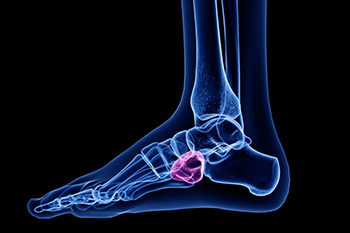
People who experience pain on the outside of the foot may have cuboid syndrome. This foot condition can follow an ankle sprain and may be difficult to diagnose. It can be common among ballet dancers and can result due to the style of dance they perform. The cuboid bone is one of seven tarsal bones and lies beneath the fourth and fifth toes. If this becomes moved from gradual overuse or an injury, it may become inflamed, referred to as cuboid syndrome. Additional causes of developing cuboid syndrome can include training on uneven surfaces, lack of adequate support from wearing the wrong shoes, or possibly excessive pronation. Some people have intermittent pain and there can be tenderness along the outside of the foot which may be similar to having an ankle injury. There are various treatment options for this condition and it is strongly advised that you are under the care of a podiatrist who can determine the best course of treatment for you.
Cuboid syndrome, also known as cuboid subluxation, occurs when the joints and ligaments near the cuboid bone in the foot become torn. If you have cuboid syndrome, consult with one of our podiatrists from Parkwood Podiatry. Our doctors will assess your condition and provide you with quality foot and ankle treatment.
Cuboid syndrome is a common cause of lateral foot pain, which is pain on the outside of the foot. The condition may happen suddenly due to an ankle sprain, or it may develop slowly overtime from repetitive tension through the bone and surrounding structures.
Causes
The most common causes of cuboid syndrome include:
- Injury – The most common cause of this ailment is an ankle sprain.
- Repetitive Strain – Tension placed through the peroneus longus muscle from repetitive activities such as jumping and running may cause excessive traction on the bone causing it to sublux.
- Altered Foot Biomechanics – Most people suffering from cuboid subluxation have flat feet.
Symptoms
A common symptom of cuboid syndrome is pain along the outside of the foot which can be felt in the ankle and toes. This pain may create walking difficulties and may cause those with the condition to walk with a limp.
Diagnosis
Diagnosis of cuboid syndrome is often difficult, and it is often misdiagnosed. X-rays, MRIs and CT scans often fail to properly show the cuboid subluxation. Although there isn’t a specific test used to diagnose cuboid syndrome, your podiatrist will usually check if pain is felt while pressing firmly on the cuboid bone of your foot.
Treatment
Just as the range of causes varies widely, so do treatments. Some more common treatments are ice therapy, rest, exercise, taping, and orthotics.
If you have any questions, please feel free to contact our offices located in Brunswick and Hinesville, GA . We offer the newest diagnostic and treatment technologies for all your foot care needs.
Dealing With Plantar Warts
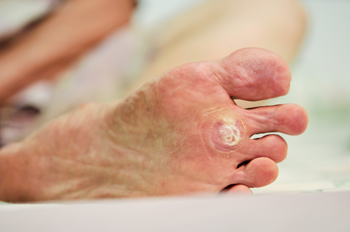
A plantar wart is a growth, usually found on the bottom of the foot, that is caused by the human papilloma virus (HPV). The virus enters the body through small cuts or breaks in the skin. Plantar warts are more common among children, teens, and seniors. Symptoms include a thickening of the skin and pain when walking or standing. They usually show up on the ball and heel of the foot. Small black dots may appear on the skin, which are dried blood from the capillaries. It is not a good idea to try to remove a plantar wart yourself. Instead, it is suggested that you visit a podiatrist, especially if the area changes color or bleeds, or if you have a compromised immune system. Among the remedies are topical creams, oral medication, laser treatments, cryotherapy (freezing the wart), acid treatments, or surgery. The podiatrist will also prescribe home foot care procedures as well as instructions for any medication prescribed. Please make an appointment with a podiatrist for safe and appropriate treatment options.
Plantar warts can be very uncomfortable. If you need your feet checked, contact one of our podiatrists from Parkwood Podiatry. Our doctors will assist you with all of your foot and ankle needs.
About Plantar Warts
Plantar warts are the result of HPV, or human papillomavirus, getting into open wounds on the feet. They are mostly found on the heels or balls of the feet.
While plantar warts are generally harmless, those experiencing excessive pain or those suffering from diabetes or a compromised immune system require immediate medical care. Plantar warts are easily diagnosed, usually through scraping off a bit of rough skin or by getting a biopsy.
Symptoms
- Lesions on the bottom of your feet, usually rough and grainy
- Hard or thick callused spots
- Wart seeds, which are small clotted blood vessels that look like little black spots
- Pain, discomfort, or tenderness of your feet when walking or standing
Treatment
- Freezing
- Electric tool removal
- Laser Treatment
- Topical Creams (prescription only)
- Over-the-counter medications
To help prevent developing plantar warts, avoid walking barefoot over abrasive surfaces that can cause cuts or wounds for HPV to get into. Avoiding direct contact with other warts, as well as not picking or rubbing existing warts, can help prevent the further spread of plantar warts. However, if you think you have developed plantar warts, speak to your podiatrist. He or she can diagnose the warts on your feet and recommend the appropriate treatment options.
If you have any questions please feel free to contact our offices located in Brunswick and Hinesville, GA . We offer the newest diagnostic and treatment technologies for all your foot and ankle needs.
Dealing With Arthritis in the Ankles
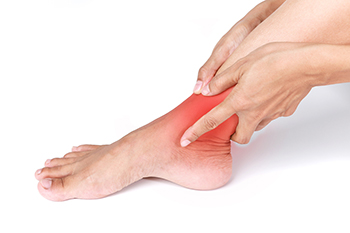
The ankle joints are used every day to walk, run, jump, or play sports. After a while, the connective tissues that form the joint like cartilage, ligaments, and tendons can simply wear out and arthritis takes over. You may notice pain, redness, heat, swelling, and less range of motion. At first, some lifestyle changes can help reduce the effects of ankle arthritis. Among them are losing weight, ceasing repetitive and strenuous activities, and taking certain medications. If none of this helps, it may be time to see a podiatrist who can offer more complex solutions. Among them is arthroscopic debridement to clean out any loose cartilage that may be causing the inflammation. Another option is arthrodesis, which is a fusion of bones in the ankle using plates, rods, pins, or screws. This may affect the range of motion and gait but offer pain relief. A final option is ankle joint replacement which comes with a long list of risks and benefits. Ask your podiatrist for more detailed information on dealing with ankle arthritis.
Arthritis can be a difficult condition to live with. If you are seeking treatment, contact one of our podiatrists from Parkwood Podiatry. Our doctors can provide the care you need to keep you pain-free and on your feet.
Arthritic Foot Care
Arthritis is a joint disorder that involves the inflammation of different joints in your body, such as those in your feet. Arthritis is often caused by a degenerative joint disease and causes mild to severe pain in all affected areas. In addition to this, swelling and stiffness in the affected joints can also be a common symptom of arthritis.
In many cases, wearing ill-fitting shoes can worsen the effects and pain of arthritis. Wearing shoes that have a lower heel and extra room can help your feet feel more comfortable. In cases of rheumatoid arthritis, the arch in your foot may become problematic. Buying shoes with proper arch support that contour to your feet can help immensely.
Alleviating Arthritic Pain
- Exercises that stretch the foot can prevent further pain and injury and increase mobility
- Most of the pain can be alleviated with anti-inflammatory drugs, heat, and topical medications
- Massages can help temporarily alleviate pain.
It is best to see your doctor for the treatment that is right for your needs and symptoms. Conditions vary, and a podiatrist can help you determine the right method of care for your feet.
If you have any questions, please feel free to contact our offices located in Brunswick and Hinesville, GA . We offer the newest diagnostic tools and technology to treat your foot and ankle needs.
Are Bunions Affecting Your Everyday Life?
How Aging Can Seriously Affect the Feet
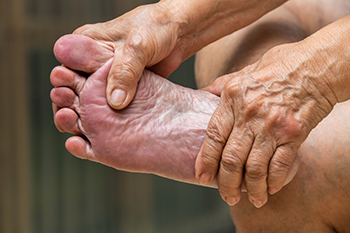
By the time you reach the age of 50, experts say that you will have walked around 75,000 miles. As a result, the general wear and tear on the feet becomes more apparent. Fat pads, skin, and bones get thinner. Feet that have been pushed into tight shoes for years become deformed. Tendons and ligaments lose strength and fail to rebound as quickly. Arches are apt to fall, causing flat feet that can result in longer feet and toes. But many older people continue to wear or buy the same shoe size. Osteoarthritis often sets in, causing inflammation in any number of the foot’s 33 joints. Older people with chronic conditions, such as diabetes, may develop neuropathy and peripheral artery disease, both of which can cause other serious foot problems. All that said, there are ways to lessen the effects of aging on your feet. Consider custom orthotics to counteract the natural decline in foot efficiency. Be on the lookout for sores that do not heal properly. Stretch or do mild exercises to promote circulatory health. Wear shoes that fit properly and offer ample support and cushioning. Pay attention to unusual or new foot pain. Finally, it is wise to consult a podiatrist for regular exams.
If you need your feet checked, contact one of our podiatrists of Parkwood Podiatry. Our doctors will attend to all of your foot and ankle needs and provide you with quality treatment.
Geriatrics and Podiatry
When people age, some common issues that may occur are bone density loss, dry skin, poor circulation, and rough brittle nails. These issues may also affect your foot health if the necessary steps are not taken to alleviate the problems.
It is important to take care of your feet because feet that are injured or diseased can affect your overall health. Having painful feet hinders your ability to do daily activities or may decrease your willingness to do the things that you need to do.
Visiting Your Geriatrician
As we age, health problems become more likely, so it is essential to visit your doctor for check-ups to ensure that you are doing the best you can to take care of your health. It is recommended to check your feet frequently for any possible cuts, bruises, swelling, corns or any other irregularities.
Taking Care of Elderly Feet
Cracked or dry feet can be treated by applying moisturizer often. It is also important not to wear old socks because the older the sock is, the higher the possibility there will be that there is bacteria there. Wear fresh socks and make sure they fit properly.
Proper foot health means that you can have a more active lifestyle and you will not be bogged down by pain. Foot health also leads to good circulation, which is paramount for overall health.
If you have any questions, please feel free to contact our offices located in Brunswick and Hinesville, GA . We offer the newest diagnostic tools and technology to treat your foot and ankle needs.

